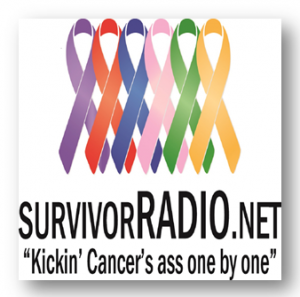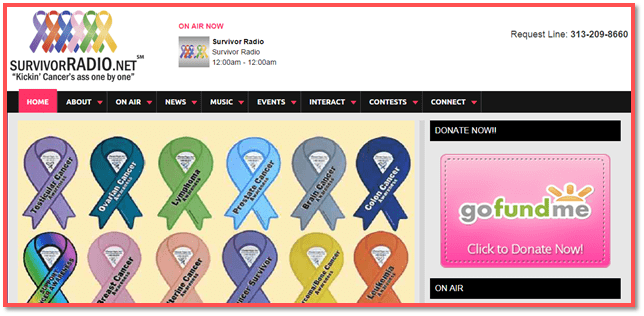Radio has always been a tribal medium. Whether you like to rock, love country, want to talk politics, or argue about your favorite football team, radio stations have always provided a place for like-minded people to gather. But with a limited number of broadcast licenses and the need to aggregate listeners to provide value for advertisers, only the biggest groups are typically represented on the terrestrial radio dial.
Today, thanks to technology, it’s possible to build online stations that are gathering places for smaller groups. And while there are plenty of examples of these types of effort, most are built around a style of music. But after Steve Mills – a 20-year radio industry veteran – was diagnosed with stage 3 Hodgkin’s lymphoma, his wife Melodie decided to build a streaming station that could serve as a home to a different type of group: cancer survivors.
 With help from her husband who is currently in remission and Richard Stadlen (who’s been in radio for more than 40 years), Melodie Mills launched Survivor Radio and The Survivor Radio Foundation. The goal is to provide assistance for cancer survivors and cancer patients, along with the families of terminally ill people suffering from cancer. That includes creating a place to express their emotions and hear upbeat, positive music. It also means being a resource to assist with incidental costs that occur when cancer patients fight this terrible disease.
With help from her husband who is currently in remission and Richard Stadlen (who’s been in radio for more than 40 years), Melodie Mills launched Survivor Radio and The Survivor Radio Foundation. The goal is to provide assistance for cancer survivors and cancer patients, along with the families of terminally ill people suffering from cancer. That includes creating a place to express their emotions and hear upbeat, positive music. It also means being a resource to assist with incidental costs that occur when cancer patients fight this terrible disease.
Radio has always stood for championing charities, good causes, and helping members of local communities through difficult times. But Survivor Radio is a unique concept – an entire streaming station dedicated to supporting and shining the light on cancer patients, survivors, and their families.
For this week’s edition of Radio’s Most Innovative, we reached out to Melodie Mills and Richard Stadlen to learn more about their plan and how they’ve brought it into action.
JM: How did the idea come about?
RS: A few weeks ago Steve, Melodie, and I were discussing an idea Steve had to develop a digital station for cancer survivors. Working off of a basic concept we discussed, I developed a playlist and mix that I felt would fit the spirit of the station. Melodie, with a little assistance from her husband, provided the technical expertise, and the business acumen and everything else Melodie and I did together.
JM: What led you to think about a radio-ish solution?
MM: We all come from radio backgrounds. My husband has been in radio over 20 years, I have 5 years of radio under my belt, and Richard is a 46 year broadcast veteran. It just felt like a natural solution.
JM: What has been the biggest hurdle you’ve faced launching Survivor Radio? How did you overcome it?
RS: Building awareness and getting the financial support we need to help survivors. We’ve only been streaming for a few weeks so that effort is still a work in progress. We’ve been using social media and our personal contacts to spread the word.
JM: Is the effort local, national, or both?
MM: This is a national effort. We assist anyone that is fighting this horrible disease, no matter where they are located, as long as they meet the criteria set forth by our organization. If they are currently battling cancer, we will assist with incidentals. If it is determined that a person is terminally ill, we will assist with bucket list items.
JM: How does streaming audio technology lend itself to achieving your goals?

RS: Survivor Radio lives exclusively online. It exists to provide an upbeat environment for cancer survivors and anyone looking for inspiration. It’s also the portal we use to attract the donations we need to help cancer survivors with their incidental expenses. We wouldn’t have had the financial resources to bring our idea to fruition using terrestrial radio.
JM: How do you gather survivors’ stories for the stream?
MM: We rely heavily on social media. Most of the stories we have received come from the various cancer pages on Facebook, interaction on Twitter and Instagram.
JM: Beyond positive music and survivor stories, does information about how to navigate dealing with cancer play a role in the programming?
RS: Absolutely! Our goal with Survivor Radio is to be a clearing house for all things relating to cancer.
JM: What role does social media play in your plans?
RS: Social media is a vital part of our effort to spread the word about Survivor Radio, to share cancer-related information and listeners’ personal experiences.
JM: Have you considered partnerships or associations with radio stations and influential personalities?
MM: We are currently in discussions about possible affiliations. Since cancer affects a good portion of the population, we are confident that the appropriate partnerships will organically take form.
JM: Do you think this type of effort is something broadcast companies should work to foster more of?
RS: Radio has always been known for its efforts to give back to the community. If Survivor Radio can serve as a model or inspiration for broadcast companies to do even more, that would be terrific.
JM: Is there anything our readers can do to help?
MM: Yes! We invite your readers to the website, www.survivorradio.org. On the website, they can listen to the upbeat, original mix of music, see some cancer facts, like our social media efforts, and make a donation that could potentially save a life!
JM: What advice do you have for someone who wants to pursue this type of initiative, but isn’t sure how and where to start?
RS: A project like this requires hard work and passion. It’s also vital to have a clear vision of your goals and to assemble a team of people who possess the technical skills, programming, and marketing experience to make it happen. Melodie, Steve, and I would be happy to talk with anyone who is looking to get started.
Thanks to Mike Stern for writing this week’s RMI.
INNOVATION QUOTE OF THE WEEK
“I have had dreams and I have had nightmares, but I have conquered my nightmares because of my dreams.”
Dr. Jonas Salk, inventor of the polio vaccine
More of Radio’s Most Innovative
- Radio’s Most Innovative: Galaxy Communications’ Ed Levine
- Radio’s Most Innovative: Greater Public’s Doug Eichten
- Radio’s Most Innovative: WNYC Studios
- Radio’s Most Innovative: Dan Vallie, National Radio Talent System
- Radio’s Most Innovative: WNIC’s “Pillow Talk” with Alan Almond
- Like A Pair Of Old Jeans - April 2, 2025
- What’s Fair Is Fair - April 1, 2025
- What’s On Your Bucket List? - March 31, 2025






Leave a Reply